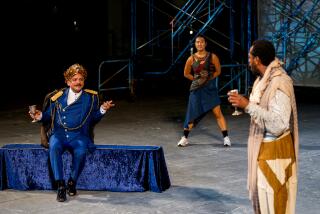Review: ‘Prometheus Bound’ is a graceful revival at Getty Villa
- Share via
Prometheus has long been a symbol of the rebel hero, a revolutionary challenging an oppressive order. Dubbed “the patron saint of the proletariat,” he is a god who sided with mankind against the immortals, bestowing on them enlightenment and the great gift of fire, crimes for which he is punished by Zeus, the universe’s reigning tyrant at the time of the myth.
In Travis Preston’s gracefully lucid staging of Aeschylus’ “Prometheus Bound” at the Getty Villa’s outdoor Barbara and Lawrence Fleischman Theater, Prometheus is carted out on a wagon that, were he not a deathless god, might be mistaken for a bier. As played by Ron Cephas Jones, this champion of humanity, already limp with pain before being enchained to a giant 5-ton wheel, brings to mind images of Jesus at the crucifixion.
“Prometheus Bound” is rarely performed, and with good reason. An immobilized protagonist presents undeniable dramatic problems, but perhaps even more difficult are the theatrical challenges posed by a playwriting imagination that conscripts into service a chorus of ocean nymphs, a few outlandish deities, and a victimized young woman transformed into a heifer and harassed by a gadfly, all of whom drop by to pay their respects to a prisoner being tortured on a far-flung mountainside.
PHOTOS: Arts and culture by The Times
Imagine the stillness of Beckett’s “Happy Days” crossed with the wildness of James Cameron’s “Avatar” and you’ll get a sense of the scale of the staging hurdles.
But the text (generally attributed to Aeschylus though questions remain) is so complexly woven and philosophically rich that it cries out for a director bold enough to meet its unorthodox demands. Preston, working with a new translation by Joel Agee that is smooth and clear without being reductive, negotiates an intelligent compromise between innovation and restraint.
His production — a collaboration between the Getty and CalArts Center for New Performance, in association with Trans Arts — is never in competition with Aeschylus’ tragedy, never experimental for experiment’s sake. A meditative rhythm, enhanced by an original jazz score by Vinny Golia and Ellen Reid, keeps the focus on the play’s religious and political depths.
The 23-foot-tall rotating steel wheel dominating Efren Delgadillo Jr.’s set design may sound gimmicky, but the machinery is conservatively employed. Its presence is more sculptural than athletic. (Cirque du Soleil-style acrobatics aren’t part of the equation.) This scenic approach taken by Preston, dean of the CalArts School of Theater and artistic director of the CalArts Center for New Performance, suits a play that is static on the surface yet nonetheless coursing with revelations.
“Prometheus Bound” harks back to an older style of tragedy than the one endorsed by Aristotle’s “Poetics.” There’s drama, but as often with Aeschylus, it’s a matter of intensification of theme. The protagonist’s growing conviction in the righteousness of his resistance to Zeus’ tyranny substitutes for rising action.
The plot, lyrically handled, revolves around a series of exchanges between Prometheus and his visitors. The chorus of ocean daughters, who speak, sing and move in unison, plead for stories. Full of sympathy, they want to know everything Prometheus knows. “Tell us, unless telling adds to your pain” is their refrain.
CRITICS’ PICKS: What to watch, where to go, what to eat
Prometheus obliges them. He will not, however, relent in his defiance of the current brutal Olympian regime. When Okeanos (Joseph Kamal), the father of the chorus, preaches the wisdom of political expediency, Prometheus only becomes more adamant.
Prometheus’ encounter with Io (an emotionally supercharged Mirjana Jokovic), the innocent lass whose life was derailed by Zeus’ lust, takes us inside the inner workings of his mind. The fates of these victims of Zeus are entwined. It’s a complicated tale but suffice it to say that Prometheus, whose name is derived from the Greek word meaning forethought, sees far into the future and knows that the arc of the moral universe is bending infinitesimally toward justice.
This faith sustains him when Hermes (Michael Blackman) races in with more threats from Zeus. Prometheus’ suffering will be excruciating, but it won’t be for naught. No wonder he has come to epitomize, despite the fanaticism of his character, the courageous nobility of principled dissent.
Jones’ performance lets you feel the emotional weight of Prometheus’ position. He speaks less in anger than in weary determination. The cost of his agonizing ordeal isn’t skimped over.
For Aeschylus, wisdom doesn’t replace suffering. It can, however, accompany it. There’s pain and there’s progress. This double reality is captured in Jones’ portrayal of a character who is indeed larger than the drama containing him. (Don’t blame Aeschylus: “Prometheus Bound” is the only surviving play in what may have been a trilogy.)
The production doesn’t crack the conundrum of the chorus. The young women assuming these impossibly ethereal roles, which may be more sea bird than sea maiden, haven’t yet found a tone that harmonizes with the gravity of Prometheus’ predicament, and Mira Kingsley’s choreography for them is still a work in progress.
This “Prometheus” may not be the most radical production in the Getty Villa’s annual outdoor staging of an ancient classic, but it is one of the clearest and, notwithstanding a few shaky spots, the most theatrically assured. Best of all, it establishes a dialogue between the world of 5th century B.C. Athens and our own. Truly, this is a revival.
--
‘Prometheus Bound’
Where: Getty Villa’s Barbara and Lawrence Fleischman Theater, 17985 Pacific Coast Highway, Pacific Palisades
When: 8 p.m. Thursdays-Saturdays. Ends Sept. 28.
Tickets: $42
Contact: (310) 440-7300 or https://www.getty.edu
Running time: 1 hour, 15 minutes
More to Read
The biggest entertainment stories
Get our big stories about Hollywood, film, television, music, arts, culture and more right in your inbox as soon as they publish.
You may occasionally receive promotional content from the Los Angeles Times.











